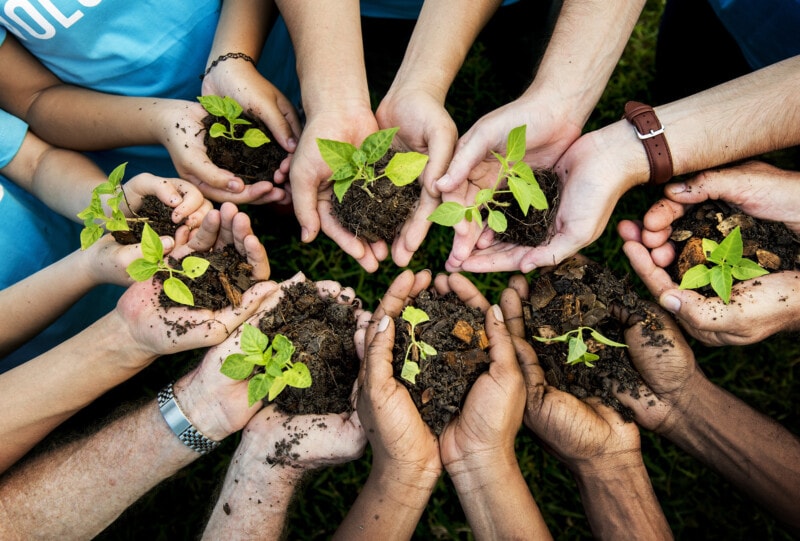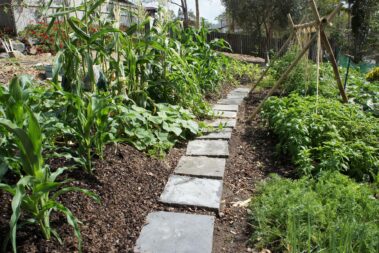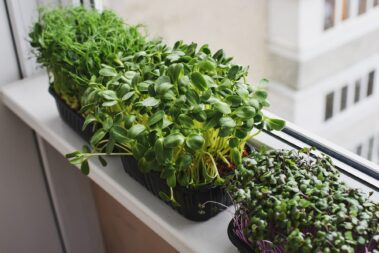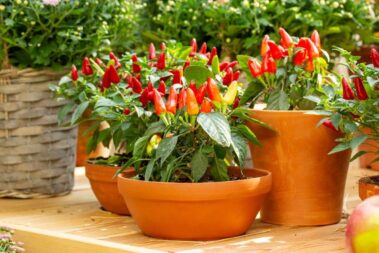There are so many reasons to choose a vegan lifestyle. When I was young, most people chose veganism because they didn’t want to contribute to the inhumane treatment of animals. Today, just as many people turn to veganism for its health benefits or because it’s better for the environment than a traditional diet.
If you step back and look at the broader picture, all of these reasons are connected.
Whether you want to be a better advocate for animals, better support our planet, or just keep yourself healthy, investing in a sustainable lifestyle is key. After all, living sustainably is better for everyone, animals, humans, and planet, included.
In this article, the first in CGS’s series on sustainability, we dive deep into the question, “What is sustainability?” We’ll look at how a vegan lifestyle caters to sustainability and what more you can do to live sustainably in your everyday life.
Table of Contents
Understanding Sustainability
Sustainability is the concept of meeting the needs of the present without compromising future generations’ ability to meet their own needs. It emphasizes the importance of maintaining ecological balance and conserving natural resources for the long-term benefit of humanity and the planet.
There are three key components to sustainability: environmental sustainability, social sustainability, and economic sustainability. Resource management between these components must be balanced and integrated in order for sustainability to be successful on a large scale.
Environmental Sustainability
Environmental sustainability focuses on preserving and protecting the natural environment. This means maintaining healthy ecosystems, protecting biodiversity, and conserving natural resources.
Minimizing pollution, reducing carbon emissions, conserving energy, and promoting the sustainable use of land, water, and air, are all key components of success in environmental sustainability.
Social Sustainability
Social sustainability emphasizes the importance of creating equitable and inclusive communities where people can lead fulfilling lives. The keys to this component include promoting social justice, human rights, and equal access to resources, education, healthcare, and employment opportunities.
Social sustainability also entails fostering a sense of community, promoting cultural diversity, and ensuring that the well-being of individuals and communities is prioritized.
Economic Sustainability
This component of sustainability is concerned with the responsible management of financial resources to support long-term economic development. This must be done without depleting resources or causing harm to the environment.
Economic sustainability involves fostering a robust economy that promotes fair trade, ethical business practices, and responsible consumption. This component must be balanced with the other two for sustainability to be successful. Economic growth can never be valued more than social well-being and environmental protection.
Sustainable Practices for Vegans
So many aspects of the vegan lifestyle are in line with sustainability practices. But how much of a positive impact you have depends on the specific choices you make with concern to your diet and life choices.
Environmental Benefits of Plant-Based Diets
Animal agriculture is one of the largest contributors to greenhouse gas emissions, wildland destruction, and a reduction in biodiversity(1). By abstaining from meat, dairy, and other animal products, vegans help reduce the demand for animal agriculture.
A declining demand for meat and dairy means less land is used to raise livestock. This opens the potential for more wildland conservation. And less livestock means fewer deadly altercations with wildlife, which helps maintain biodiversity, especially in the category of apex predators.
Reduced levels of animal agriculture also reduce our carbon footprint. Animal agriculture produces 65% of the world’s nitrous oxide emissions(2). This gas has a global warming impact that is nearly 300 times that of carbon dioxide.
Fewer animals being raised for meat, dairy, and eggs also reduces water use and the amount of land allocated to growing animal feed.
Importance of Organic and Local Produce
Not eating meat has a huge environmental impact. But simply eating plants over animals isn’t enough to live sustainably. Where your fruits and vegetables come from also matters.
Choosing organic produce reduces the use of chemical pesticides and herbicides. These chemicals contribute to ecological destruction and soil degradation. Both the manufacture and use of these agricultural products contribute to water and air pollution.
This positive impact can be furthered by supporting local farms. Not only does this reduce the environmental cost of transporting goods long distances, but it offers the opportunity to support farmers who are doing more to reduce their impact.
Beyond Food: Sustainable Lifestyle Choices
Veganism is more than a diet. It’s a lifestyle. And the benefits of this lifestyle go well beyond what food choice alone can produce.
By choosing ethical and sustainable clothing, home products, and more, vegans not only reduce their own carbon footprint but also support businesses with a lower carbon footprint. The more success these kinds of businesses have, the more other companies will emulate their practices.
How You Can Incorporate Sustainability into Everyday Life
Everyone can do more to support sustainability, even vegans!
Here are three ways you can easily increase your sustainability efforts to have a more positive impact.
Sustainable Cooking Practices
How sustainable your kitchen habits are goes way beyond what type of food you eat. Here are some easy steps you can take to embrace sustainability in your cooking practices.
- Minimize Food Waste. You can reduce food waste by planning your meals and shopping trips carefully. Composting what waste you do create reduces how much trash ends up in landfills and reduces methane emissions from the anaerobic decomposition of food. Pro Tip: Grow herbs and vegetables from leftover food scraps.
- Emphasize Whole Foods. Opt for whole foods such as grains, legumes, fruits, and vegetables. These foods generally require fewer resources to produce compared to heavily processed or packaged foods.
- Choose Locally Sourced Ingredients. Farmers’ markets and CSA programs are excellent sources of locally sourced ingredients.
- Use Energy-Efficient Cooking Methods. Conserve energy by using energy-efficient appliances, such as induction cooktops or slow cookers. Also, consider using lids while cooking to retain heat and reduce cooking time.
- Reduce Water Usage. Use water efficiently during cooking. Reuse water when possible, such as using vegetable cooking water as a base for soups or catching water while washing veggies to water your plants with.
- Utilize Sustainable Cooking Equipment. Opt for sustainable cooking equipment, such as bamboo utensils, environmentally friendly cookware, and glass containers. Pro Tip: Use microfiber cleaning cloths in the kitchen instead of paper towels.
- Practice Zero-Waste Cooking. Engage in zero-waste cooking by utilizing vegetable peels, stems, and leaves in creative ways, such as making stocks, broths, or incorporating them into recipes. And utilize best practices for storing food to prevent it from going bad, such as garlic keepers and herb keepers.
- Grow Your Own Herbs and Vegetables. If possible, cultivate a small herb or vegetable garden at home. Use permaculture practices when possible and make your own compost and fertilizer tea so you don’t have to buy synthetic products. Pro Tip: You can grow your own mushrooms indoors or out and even forage for wild mushrooms in many areas.
- Support Sustainable and Ethical Food Brands. Choose products from companies that prioritize sustainability and ethical sourcing. Look for certifications such as Fair Trade, USDA Organic, or Non-GMO Project Verified, indicating environmentally friendly and socially responsible practices. Choose cruelty-free substitutes such as vegan butter and vegan supplements.
Sustainable Shopping Habits
One of the pillars of sustainability is mindful consumption. This means not only limiting how much you use but being very thoughtful in what you do buy and what companies you buy from.
Here are some tips for shopping more mindfully and sustainably.
- Choose Local and Seasonal Produce. Support local farmers and reduce the carbon footprint associated with transportation by purchasing locally grown, seasonal fruits, and vegetables.
- Reduce Packaging Waste. Choose items with eco-friendly packaging materials, or buy in bulk to minimize the use of single-use plastics and packaging.
- Select Ethically Sourced Products. Look for certifications such as Fair Trade, which ensures that products are sourced ethically and sustainably, benefiting both producers and the environment.
- Prioritize Sustainable and Eco-Friendly Brands. Look for certifications such as B Corp, USDA Organic, or FSC certification. One of our favorites is Got Bag, which turns plastic waste into stylish purses and backpacks.
- Reduce Single-Use Plastic Consumption. Use reusable shopping bags, produce bags, and containers to avoid single-use plastics. And opt for alternatives such as glass, paper, or metal packaging whenever possible.
- Support Local and Sustainable Clothing Brands. Support brands that adhere to fair labor practices and promote sustainable manufacturing processes. And opt for sustainable materials such as organic cotton, hemp, and bamboo.
- Shop Secondhand and Thrift Stores. Reduce waste and resource use by purchasing secondhand items, including clothing, furniture, and household goods.
- Consider the Lifecycle of Products. Choose durable, high-quality items that have a longer lifespan and can be repaired or recycled easily.
- Reduce Impulse Purchases. Practice mindful consumption by avoiding impulse purchases and only buying items that are necessary or bring value to your life. Consider the environmental and social impact of each purchase before making a decision.
Engaging in Community Sustainability Efforts
Sustainability isn’t a lifestyle that can be practiced in a vacuum. In order for your efforts to have an impact, they need to be mirrored by your community.
Here are some easy ways in which vegans can engage in community sustainability efforts.
- Participate in Local Environmental Initiatives. Participate in activities such as tree planting, beach clean-ups, or neighborhood recycling programs.
- Advocate for Sustainable Policies. Collaborate with local authorities, attend town hall meetings, or participate in campaigns that aim to implement eco-friendly practices and policies.
- Educate and Raise Awareness. Organize workshops, seminars, or informational sessions to share information about the relationship between veganism and sustainability, and encourage others to adopt eco-friendly practices in their daily lives.
- Support Local Sustainable Businesses. Encourage the community to support farmers’ markets, eco-friendly stores, and sustainable restaurants that offer plant-based options.
- Collaborate with Community Gardens and Urban Farms. Volunteer at community gardens or urban farms that promote sustainable agriculture and provide fresh produce to local residents.
- Promote Sustainable Transportation. Encourage the community to reduce their carbon footprint by choosing alternative transportation methods and promoting the development of infrastructure that supports eco-friendly commuting.
A Sustainable Life for a Brighter Future
By taking your vegan lifestyle to a more sustainable level, you can do more to support the environment, animals, and a healthier, greener future for yourself.
Implementing sustainable cooking practices and shopping habits, and engaging your community to do the same can have a lasting impact on sustainability locally and globally.
But this article only scratches the surface of what it means to live sustainably. Look for upcoming posts under this multi-part series to learn more about sustainability practices and what it takes to truly live a clean, green, simple life.
- How to Pick the Perfect Watermelon For a Sweet Summer Treat - April 10, 2024
- Future Kind’s Foundations: A Multivitamin Made for Vegans - December 5, 2023
- Does Nutritional Yeast Go Bad? - November 28, 2023








